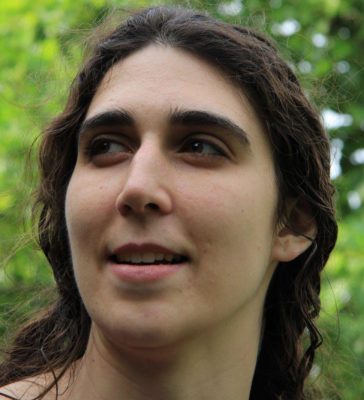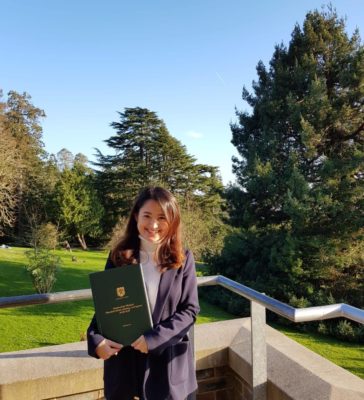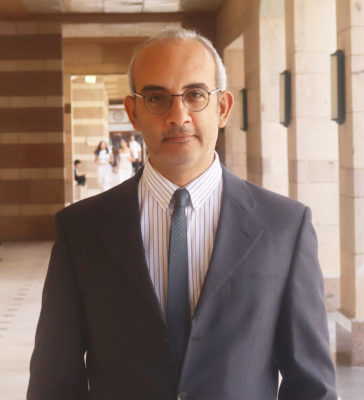
Caitlin McDonald
Current Employer/Organisation Name
Creative Informatics, University of Edinburgh
What have you been doing since leaving Exeter, and what are you doing now?
Creative Informatics is an R&D partnership designed to help the creative industries, including art, architecture, design, performing arts, and GLAM institutions, to make better use of the power of data and data-driven technologies. While this is an academic role it is also very closely involved with both the creative industries and the tech industry. Before returning to this academic position I worked for three years as a strategist for a technology research and advisory group, advising senior leaders in large multinational businesses about the future of technology, and before that as a data and insights manager at a large education publishing company providing their operational reporting and running market insights and audience analysis programmes.
Why did you choose this career? And what do you enjoy most about your work?
One of the great things about working in technology is that it’s a very dynamic field where new types of jobs are always emerging and it’s relatively easy to get in on the ‘ground floor’ as a new niche develops. There are always new, innovative professions emerging where there is a shortage of skills and relatively little formal qualification required as the discipline is still being worked out. Software development in general (including data analysis and engineering) usually has some novel roles right at the vanguard of development so there are often many early and mid-career positions available where a range of educational backgrounds might be appreciated by hiring managers. This means that I get to work with a lot of people with vastly different skills who think in all kinds of different ways, and compared to other types of professions which might be more formalized, there are more opportunities to try things out and make career changes. In my current job, I’m most enjoying the opportunity to support creatives with their work, and I think there is a lot of potential for creating a more sustainable future for the arts through data and technology.
Please tell us if you were a member of any societies, groups or sports clubs?
Arabic Soc, World Music Choir, Jiu Jitsu.
What did you enjoy most about your programme and what was the biggest highlight?
Because I was in what’s called an ‘area studies’ department, I was working with a range of people who had different skills and areas of research interest. This prepared me well for the interdisciplinary work I did in academia, as it meant I could talk to all kinds of different people about my work who had different backgrounds and skills, and I felt comfortable combining ideas from different schools of thought. This has been a real asset through my work in the private sector, as well as now that I’m working in an academia-industry partnership.
What skills and experiences have been most useful for your career?
Writing skills have always been essential, but never more so in the last few years as I spent more time writing white papers for consumption by senior executives, and translating my research outcomes into articles for the popular press and relevant trade publications. The anthropologist’s open-ended questioning and approaching a novel situation like a child who has no assumed knowledge (or an alien from another planet) is often very useful for uncovering organisational processes that have become stuck in some way, because everyone already working on it is too jaded to see a fresh approach. As a strategist there was very little formal training involved, but it was very important to understand the mindset of CEOs and other senior business leaders, and how they prefer to consume information. Unlike academia, which primarily works in the language of the peer-reviewed journal paper, business leaders are typically reading articles in the business press like HBR, the Wall Street Journal, CEO Today and so forth, or they prefer content in the form of analyst briefings with brief, directive slides instead of discursive papers. CEOs prefer to speak in the language of action: they are usually more concerned with what they should do as a result of knowing a piece of information than the provenance it came from, so action-oriented recommendations are typically well-received, while literature reviews and methodology discussions usually have them fidgeting and checking their email.
What advice would you give to a current student who wishes to pursue your career?
Confession: I initially became an anthropologist because I wasn’t drawn to quantitative methods (or generally, math and numbers) at all. It was a source of great merriment to my friends and family that my very first job after my studies was a very heavily data-focused one–a switch that was really only possible because there is such a strong demand for quantitative analytical skills that even I, with virtually no background in quantitative analysis, could get a job doing that. This has become more formalised since I finished my PhD and I expect students with little or no quantitative analysis background would struggle to follow the same route. But as I mentioned earlier, the tech industry in general is so dynamic that there are often hiring managers looking for a very broad range of skills for roles that are still only emerging or being created, so while I would stress the value of spending some time understanding quantitative data and data systems, don’t undervalue your qualitative skills either: these will serve you well in almost any organization. I also feel compelled to mention though math in itself never really sets my heart on fire, I did become very interested in the narrative power of data and how organizations use quantitative data as a cultural object to set strategic objectives and achieve goals–a particularly anthropological way of looking at the discipline!
What are your plans for the future?
I’m currently most excited about finding routes to continue supporting the creative industries through technology, so whether that is continuing research in academia, finding an industry partnership or accelerator programme, or moving into a policy role, I am looking forward to using my unique blend of skills to support the arts.

